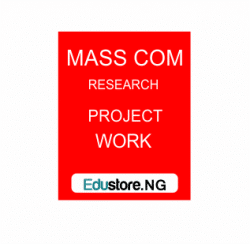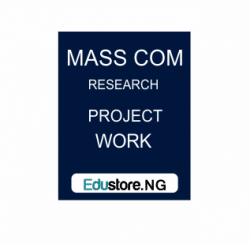ABSTRACT
The project work centered on attitudes of audience towards Yoruba news presentation on television in selected areas in Ibadan. In the study the researcher first, identified possible ways through which standard Yoruba language can be portrayed to the public.
In the first chapter the project pin points the introduction of Yoruba language, the background of the study, the statement of the problem of the study, the purpose of the limitations of the study, aims and significance of the study e.t.c.
More so, chapter two of this study covers the review of related literature on the use of Yoruba language on television stations. In addition Methodology and design, where questionnaire and data collect are equally analyzed and correlated with findings.
In the end, it was found that standard Yoruba language on television programmes actually had impact on viewers and so it is capable of positively changing the audience.
CHAPTER ONE
1.1 INTRODUCTION
Television and radio are the electronic vehicles that transport million of persons each day to far away laces. They are the present day technological revolution that has been transforming much of the worlds for the past two centuries and their impact on our social, political and cultural life has been profound. The media also have tremendous impact on world civilization. Broadcasting started in Nigeria with the inception of wired broadcasting known as radio distribution service or reinfusion, developed in Great Britain by the British broadcasting corporation (BBC ).
Broadcasting came to Nigeria in pursuit of its colonial interest, Britain found if convenient to set-up an experimental radio receiving station in Lagos. This was done in December 1932 to pick up short wave transmissions of the British broadcasting corporation empire service in 1974. Three years later the receiving station became a radio distribution station that is, a reinfusion centre extending beyond Lagos to London and Kaduna respectively, such that broadcasting wired service was taken gradually to other population centers.
Broadcasting came to Nigeria in 1949. Interestingly, Nigerian broadcasting service was inaugurated in 1957, accordingly, under the statutory corporation act (NBC NO 39 OF 1957) having fully achieved an independent status as a district government development. Broadcasting is defined as primarily, a medium for prompt delivery of information through carefully designed and selected programmes such as, cover news, music, drama and information. It is essential to inform and entertain and educate to protect culture, break down barriers and reduce the world to a global village.
DISCLAIMER:
- For Reference Only: Materials are for research, citation, and idea generation purposes and not for submission as your original final year project work.
- Avoid Plagiarism: Do not copy or submit this content as your own project. Doing so may result in academic consequences.
- Use as a Framework: This complete project research material should guide the development of your own final year project work.
- Academic Access: This platform is designed to reduce the stress of visiting school libraries by providing easy access to research materials.
- Institutional Support: Tertiary institutions encourage the review of previous academic works such as journals and theses.
- Open Education: The site is maintained through paid subscriptions to continue offering open access educational resources.




